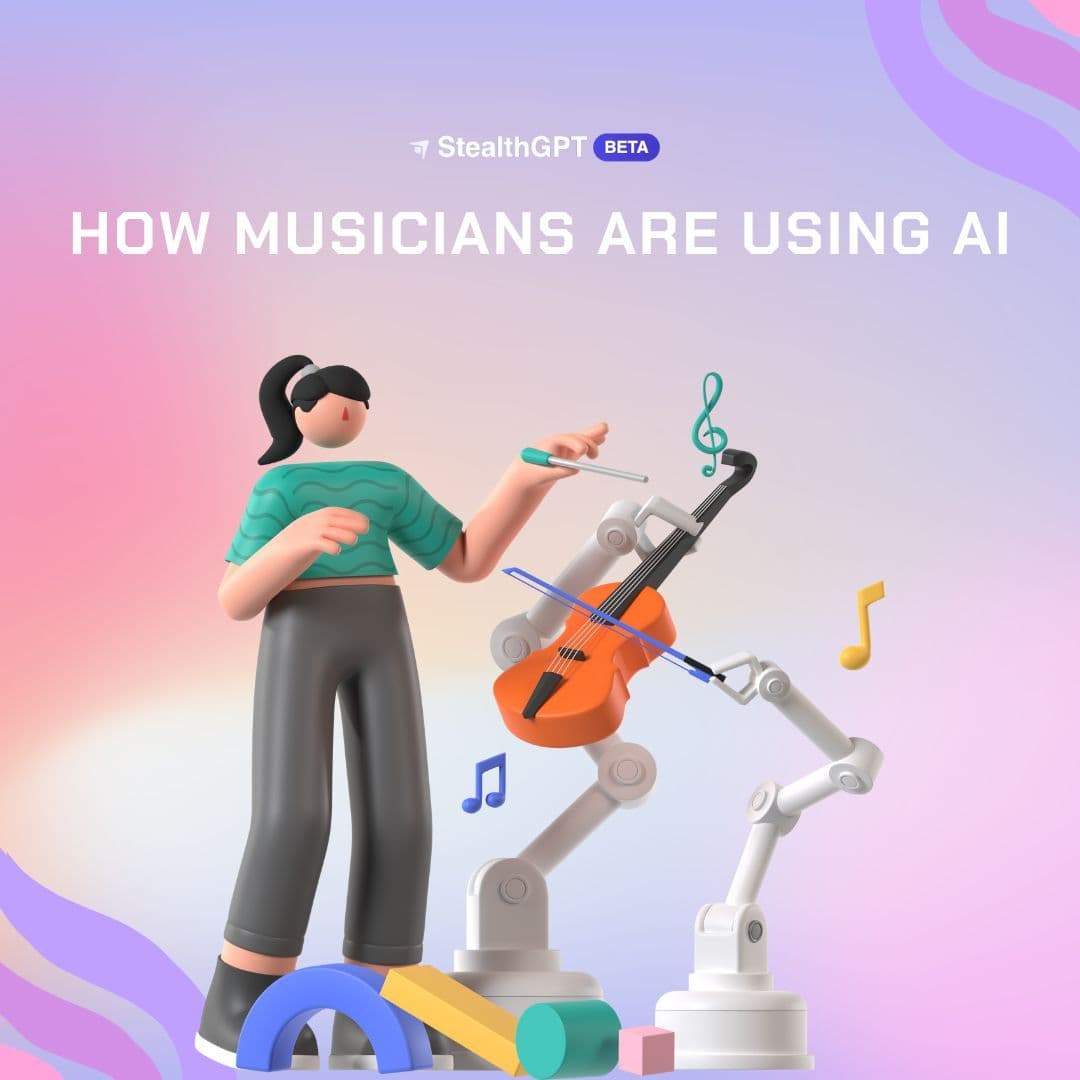Blog, Editorial
How Musicians are Using AI
How Musicians are Using AI
For whatever reason, the first artists people think of when generative artificial intelligence (AI) is mentioned are usually writers and visual artists. Perhaps they feel AI image generators and AI writing tools are far more prevalent than AI music generators.
Much of this has to do with how we enjoy music versus other art forms. We listen to music on streaming services that protect intellectual property unlike the AI art and text we encounter all over the internet.
For the most part, real musicians have no interest in AI technology that makes purely AI generated music. There are, however, a variety of uses for AI in music production, engineering, and composition that musicians are taking full advantage of without compromising their vision, ethics, or creative process.

The benefits of AI in music are numerous and to analyze their impacts, we're going to go through many of the artists using AI and the popular softwares currently being integrated into the music industry.
AI For Music Composition
Many artists are integrating AI as part of their artistic output. One of the more progressive pop icons of our time, Grimes, even released her own AI platform known as Elftech which allows users to add her vocals to any track without penalty, offering a 50% revenue share if the song explodes.
Similarly in the news, Dave Blunts is collaborating with Ye (Kanye West) on World War 3, an album that is rumored to use AI to recreate Ye's vocals on tracks written by Blunts. These rumors stem from both statements from Dave claiming he wrote the whole album and previewed tracks which feature a lo-fi quality to Ye's vocals.
Brazilian music producer and DJ, Arca, uses Bronze, an AI tool that allows her to compose tracks that never repeat themselves. Arca considers using AI tools as new opportunities to expand the boundaries of creativity within music creation.
Echo (Danny The Street) is music generated by AI for Arca's contribution to the lobby of the Museum of Modern Art (MoMA) in New York. The soundscape constantly mutates so listeners never hear the same piece of music twice.
Another iconic female artist that has always pushed boundaries is Bjork. In collaboration with Microsoft, she created ",[object Object] a soundscape that constantly adapts to real time weather conditions. Combined with data gathered by cameras outside the Sister Hotel in New York where the soundscape plays, the AI is trained on Bjork's vast musical archive.
Music Duo, Feral Five, don't just collaborate with AI to make music, they introduced an AI character into the group in a move that reminded music lovers of Gorillaz's animated component. Feral Five explores technological impacts by using visuals created by AI algorithms and AI-powered data gathering for audience engagement.
When David Guetta wanted Eminem's vocals on a track, he simply used AI to generate them. AI music generators often take the form of websites dedicated to recreate one specific artist's musical style. Both Drake and The Weeknd have websites where you can input lyrics and output their vocals.
Unlike Grimes, Drake and The Weeknd believe in the intellectual property of their voices, and using them comes with penalty if AI users intend to monetize off their vocals. Such was the case when TikTok user Ghostwriter977 employed such tools to have Drake and The Weeknd "sing" on his track "Heart on My Sleeve". The song got taken down, but not before going viral.
Lastly, perhaps the strongest case for using AI in music composition was the AI used by Peter Jackson's production company to isolate John Lennon's vocals to assist in the production of the latest Beatles release, "Now and Then".

With the power to not just resurrect the Beatles but win them a Grammy for Best Rock performance, maybe artificial intelligence and music don't have to be at odds. Maybe AI in the music industry holds more promise to enhance human creativity than compromise it.
Use our Free AI Detector to check your content
Your Text
AI Detection Score
Run a standard or enhanced scan to check your text for AI.
Results will appear here
AI Apps for Music Composition
Here are some commonly used apps utilized for music composition:
Suno: From idea to music in an instant.
Aiva: Allows users to generate original music with AI.
Jarvis: AI that helps musicians generate lyrics in case they have writer's block.
StealthGPT: Undetectable writing for musicians needing everything from lyrics to marketing materials.
Artificial Intelligence in Music Production and Engineering
AI might have the most useful impacts on the sectors of production and engineering. AI plugins are currently reinventing workflows in the studio with abilities that let producers generate sounds, discover new chord progressions, and create a starting point for mixing and mastering.
AI Apps for Music Production, Mixing, and Mastering
Here are commonly used apps for music producers and engineers:
Moises: A stem separation tool that allows users to input music then isolate elements like vocals, instruments, and more to refine them further.
Neutron: A suite of mixing plugins that allow for unparalleled controls and optimized studio workflow.
LANDR: AI mastering that allows for personalizes results with improved EQ, refined width, no unwanted distortion, and more to ensure your song is release-ready.
Conclusion
Whether it's in art, film, education, or music, artists and users are slowly easing up to using AI in their work. It's only a matter of time until AI usage is mainstreamed in these industries and no longer shamed.
With this in mind, creatives should become AI literate to understand the potential each of these new tools offer them in creating their art.

